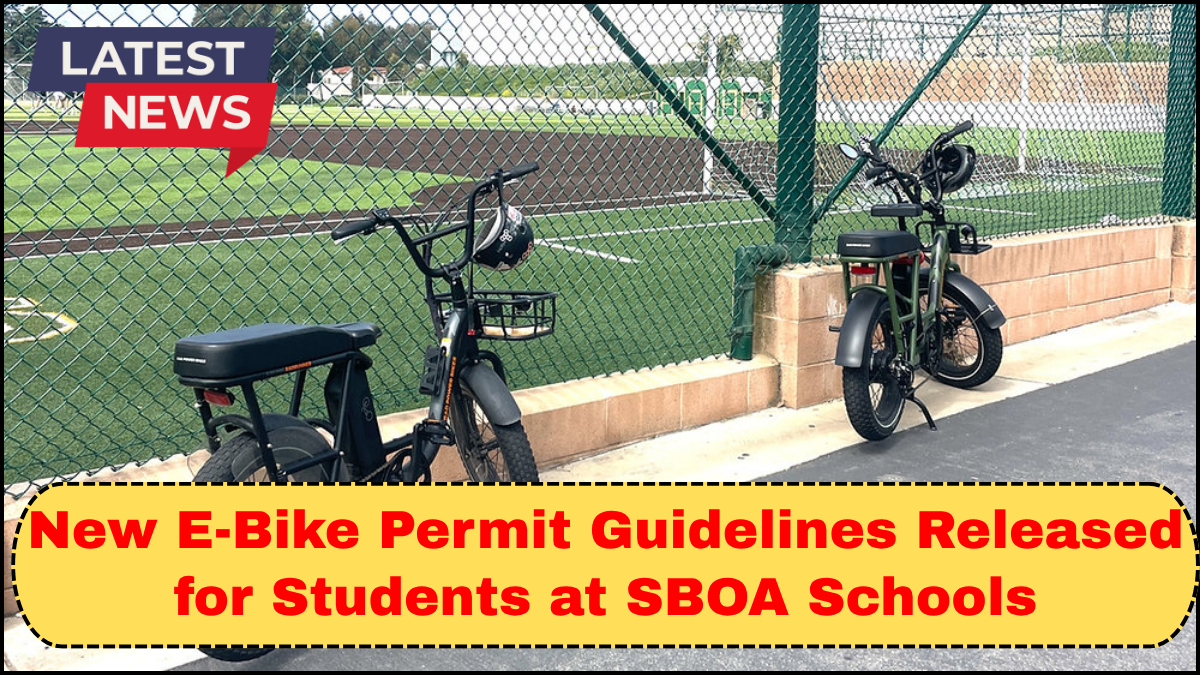In a move to promote road safety and ensure responsible e-bike usage among students, SBOA Schools have introduced new e-bike permit guidelines for the academic year. The updated framework outlines a structured student e-bike permit process, combining awareness, accountability, and regulatory compliance. These changes aim to foster a safer campus environment while aligning with broader transportation policies and legal standards.

Understanding the Need for Updated Guidelines
With the growing popularity of electric bikes among students for daily commutes, concerns around traffic discipline, parking congestion, and legal compliance have risen sharply. School authorities observed an increase in accidents and unauthorized riding, particularly among underage students lacking the necessary permits.
The new guidelines are designed not only to regulate usage but to educate students about road ethics, vehicle maintenance, and their legal responsibilities as e-bike riders.
Key Highlights of the Student E-Bike Permit Process
The newly introduced student e-bike permit process involves several steps to ensure that students are eligible, informed, and legally compliant. Here’s a breakdown of the mandatory requirements:
1. Eligibility Criteria
-
Students must be at least 16 years of age to apply.
-
A valid two-wheeler learner’s license or full license is required.
-
Parental consent is mandatory for all applicants under 18.
2. Documentation
Students must submit the following documents to the school’s transport department:
-
Photocopy of a valid two-wheeler license (learner or permanent).
-
Proof of insurance for the vehicle.
-
Recent passport-size photograph.
-
Letter of consent signed by a parent or guardian.
3. Safety Orientation Program
All applicants are required to attend a school-conducted safety workshop. The session covers:
-
Road rules and traffic signs.
-
Handling e-bikes in congested areas.
-
Emergency response protocols in case of accidents.
-
Environmental impact and maintenance tips.
This educational component ensures that students are not only qualified on paper but also trained to behave responsibly on the road.
4. Vehicle Inspection
Before issuing permits, the school’s safety officer will conduct a basic inspection of the e-bike, checking:
-
Functional brakes and lights.
-
Indicators and horn.
-
Tyre condition and overall roadworthiness.
-
Battery safety and proper charging setup.
Any vehicle found not meeting the safety standards will not be approved until necessary corrections are made.
Integration with Licensing Authorities
To streamline the two-wheeler license guide for students, SBOA Schools are also collaborating with local transport offices. Scheduled sessions for learner’s license registrations and renewals are being hosted on campus to make the process more accessible. Guidance counselors will help students prepare for the written tests and understand legal obligations under the Motor Vehicles Act.
This partnership ensures a smoother transition from school permit holders to legally licensed road users.
Monitoring and Enforcement
To uphold compliance, the school has set up regular checks within the premises. Students found riding without a valid permit or license will face disciplinary action, which may include:
-
Temporary suspension of campus mobility privileges.
-
Notification to parents.
-
In severe or repeated cases, confiscation of the vehicle.
Security personnel and designated staff members will monitor drop-off and parking zones, and random audits will be conducted during arrival and dismissal times.
Promoting a Culture of Safety and Responsibility
SBOA’s initiative goes beyond rules and penalties. The core goal is to build a responsible student community that values safety, respects laws, and understands the implications of road behavior.
To encourage positive engagement, the school will also host awareness events, such as:
-
Road Safety Week campaigns.
-
Poster and essay competitions on traffic safety.
-
Guest lectures from traffic police and e-bike manufacturers.
These activities aim to create a culture where e-bike ownership is seen as a privilege earned through responsibility, not just a convenience.
Frequently Asked Questions (FAQ)
Q1: Can students under 16 apply for an e-bike permit?
No. The minimum age to apply for a student e-bike permit is 16, in line with national road safety regulations.
Q2: Is a learner’s license acceptable for getting the permit?
Yes. Students with a valid learner’s license can apply, provided they also complete the safety orientation program.
Q3: What happens if a student rides an e-bike without a permit on campus?
They may face disciplinary action including vehicle confiscation, temporary suspension, and parent notification.
Q4: Can the permit be transferred if a student changes vehicles?
No. A new inspection must be completed for each new vehicle before the permit can be updated.
Q5: Who should students contact for questions about the permit process?
Students should approach the school’s transport coordinator or administration office for detailed guidance.
click here to learn more